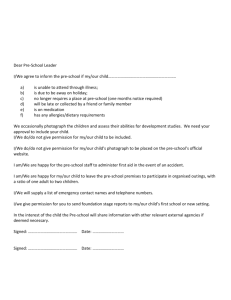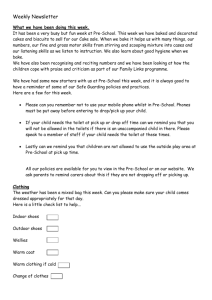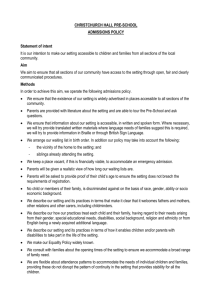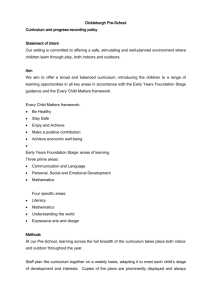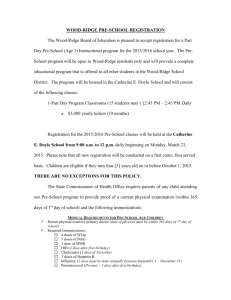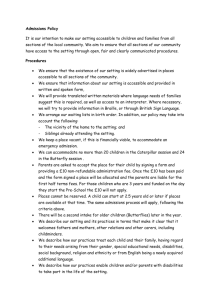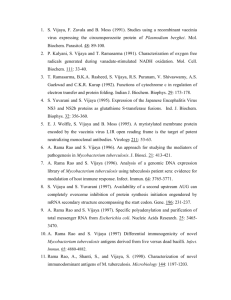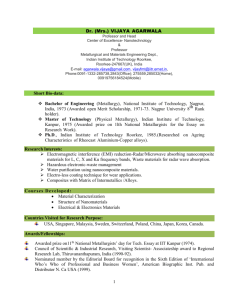Training Session II Report
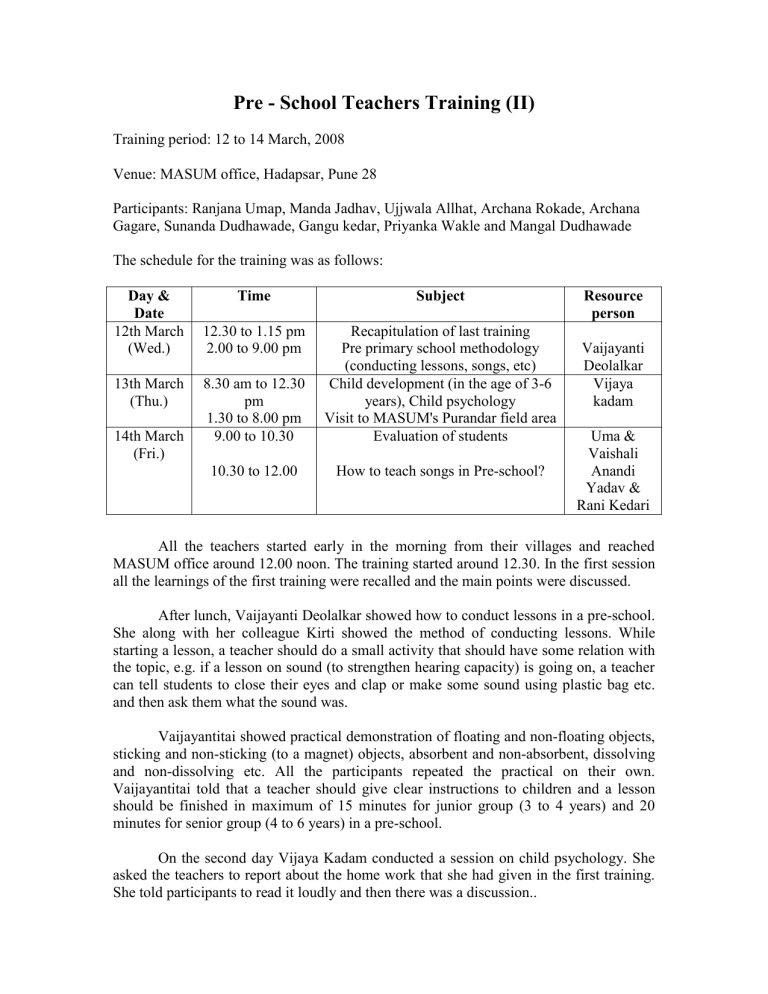
Pre - School Teachers Training (II)
Training period: 12 to 14 March, 2008
Venue: MASUM office, Hadapsar, Pune 28
Participants: Ranjana Umap, Manda Jadhav, Ujjwala Allhat, Archana Rokade, Archana
Gagare, Sunanda Dudhawade, Gangu kedar, Priyanka Wakle and Mangal Dudhawade
The schedule for the training was as follows:
Time Subject Day &
Date
12th March
(Wed.)
13th March
(Thu.)
14th March
(Fri.)
12.30 to 1.15 pm
2.00 to 9.00 pm
8.30 am to 12.30 pm
1.30 to 8.00 pm
9.00 to 10.30
10.30 to 12.00
Recapitulation of last training
Pre primary school methodology
(conducting lessons, songs, etc)
Child development (in the age of 3-6 years), Child psychology
Visit to MASUM's Purandar field area
Evaluation of students
How to teach songs in Pre-school?
Resource person
Vaijayanti
Deolalkar
Vijaya kadam
Uma &
Vaishali
Anandi
Yadav &
Rani Kedari
All the teachers started early in the morning from their villages and reached
MASUM office around 12.00 noon. The training started around 12.30. In the first session all the learnings of the first training were recalled and the main points were discussed.
After lunch, Vaijayanti Deolalkar showed how to conduct lessons in a pre-school.
She along with her colleague Kirti showed the method of conducting lessons. While starting a lesson, a teacher should do a small activity that should have some relation with the topic, e.g. if a lesson on sound (to strengthen hearing capacity) is going on, a teacher can tell students to close their eyes and clap or make some sound using plastic bag etc. and then ask them what the sound was.
Vaijayantitai showed practical demonstration of floating and non-floating objects, sticking and non-sticking (to a magnet) objects, absorbent and non-absorbent, dissolving and non-dissolving etc. All the participants repeated the practical on their own.
Vaijayantitai told that a teacher should give clear instructions to children and a lesson should be finished in maximum of 15 minutes for junior group (3 to 4 years) and 20 minutes for senior group (4 to 6 years) in a pre-school.
On the second day Vijaya Kadam conducted a session on child psychology. She asked the teachers to report about the home work that she had given in the first training.
She told participants to read it loudly and then there was a discussion..
After the discussion on homework, she told about thought, emotion and behavior.
When a child sees his mother, a thought comes to his mind, emotion emerges from it and behavior happens accordingly. In this process, mother is a stimulant. We can describe this process as follows:
Thought Emotion Behavior
Some children at times laugh without any reason. They do this for recreation.
Also if they are happy, they laugh. Children below 6 years express their anger by crying.
They do not have emotion of sorrow like adults. If a child wears other's slippers, it's because of curiosity. We can't name it as selfishness.
Children tell us many things and it's favorable for the process of their cognitive and linguistic development. Therefore, a teacher should listen very carefully what a child is saying.
Children in this age do not find appropriate words to express their feelings. They are in the centre of what they think. It is difficult for a three years old child to think about others but a 6 year old child can do this up to some extent. Three of the teachers had mentioned in their homework that some children were mumbling while talking. While talking to children, many times it is found that adults too talk incoherent. Actually they should not do this.
A child expects that teacher should give every task first to him. But a teacher should consider that they have to give task to every child in the class. When we tell a story in the class, children want to add something in it. In this age, their logical thinking process isn't well developed. So they have their own ideas. Sometimes adults can't even think about those ideas but children express it. We should accept it and sometimes ignore it.
Vijaya gave information about step by step growth of height, weight, bones, teeth, and muscles of a child using data and told that a teacher should record the growth of height and weight. If physical growth is below average, a teacher should try to find the reasons behind it. Vijaya also told about a step by step development of motor coordination.
In this age, children should have good role models in front of them and they should get proper guidance as well as motivation.
While teaching, a teacher should focus on single skill at a time and should not mix too many together, e.g. threading big and small beads at a time will be difficult. So a teacher should give first big beads and after developing the skill can give small beads.
Children learn by using trial and error method and they should get an opportunity of doing this. They learn by imitation too.
A child, whose right brain is more developed, mainly uses left hand and vice versa. Therefore if a child is using left hand for writing, a teacher should not prevent him from doing so. Actually if a child constantly uses both hands, connections in brain get more developed. So motivation for using both hands is very important.
At the end of the session, Vijaya gave information about speech development.
There are three processes. Learning words, knowledge of word and making sentences.
After lunch, all the participants visited MASUM's Purandar field area. MASUM's activists Mangal Magar, Anandi Yadav and Jayashri Nalage gave information about
MASUM's programmes in Purandar.
On the third day morning, there was a discussion about inter-connections between
MASUM's programmes. If there is violence on a woman in the family, children in the family also get affected. If a child in pre-school is not progressing well or having behavioral problem, then a teacher should try to find reasons and family violence might be one of them. A teacher will not discriminate between boy and a girl and also will not teach them patriarchal or discriminatory songs.
After this discussion, Umatai and Vaishalitai from Aksharnandan School (One of the very famous experimental Schools in Pune city) told them about how to do the evaluation. A connection between teaching and learning is evaluation. This evaluation is not of a student alone but also of a teacher.
A teacher should give enough time to every child to settle in pre-school by singing songs, telling stories, listening carefully etc. A teacher should not start lessons directly as soon as children came to the class. Children should be given some time to settle down and make noise.
In Aksharnandan, evaluation is done twice in a year. Without taking exams, the teachers record the progress using sentences like 'a child can do this well', 'he needs practice'. While doing evaluation, they do not give marks because giving marks introduces comparison and that affects behavior.
While evaluating a child in junior group, a teacher should focus first on physical development. If physical development is normal, only then a child can do other things.
For first six months in pre-school, if a child does not show much progress, even then we should use positive language in evaluation.
For senior group children, we should give specific physical actions like walking on bricks etc. We should also see for how long a child can sit and concentrate on any activity. Whether a child is doing the activity easily or takes more time should also be recorded. Giving scope to the imagination of a child is very important.
A teacher should keep in mind that while teaching she should evaluate herself.
She should be searching new things for teaching and should give different types of activities to children. She should provide different opportunities to children consciously.
Umatai and Vaishalitai showed their yearly planning and a sample of weekly planning based on yearly planning as well as their evaluation record book. A teacher should write regularly about the progress and based on that they should write six monthly evaluation reports.
In the last session of the training, MASUM's activists Anandi Yadav and Rani
Kedari taught songs to participants. All the songs and accompanying actions were appreciated by the participants.
********
